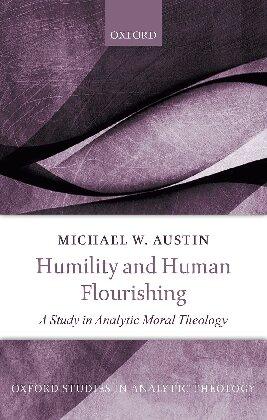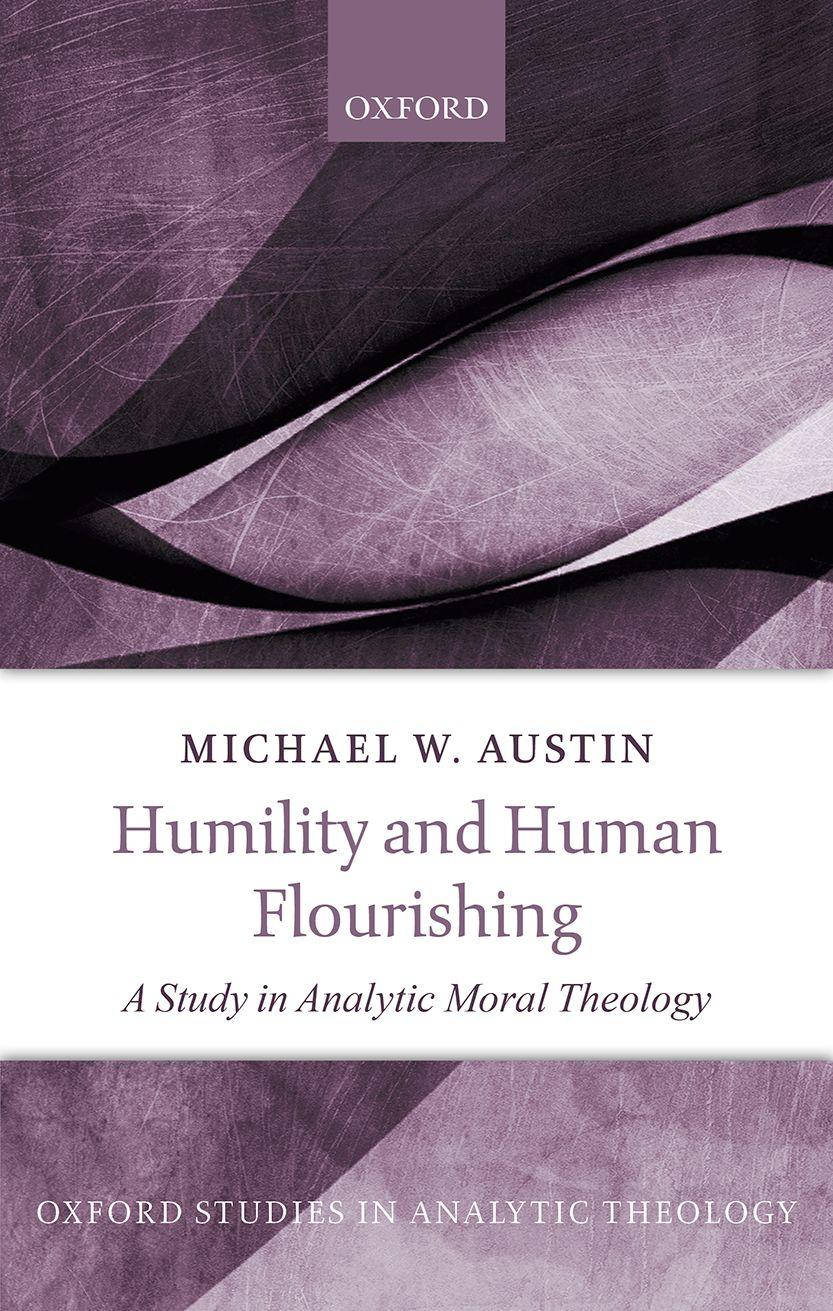Humility and Human Flourishing : A Study in Analytic Moral Theology
Michael W. Austin
Visit to download the full and correct content document: https://ebookmass.com/product/humility-and-human-flourishing-a-study-in-analytic-m oral-theology-michael-w-austin/


OXFORDSTUDIESINANALYTICTHEOLOGY
SeriesEditors
MichaelC.ReaOliverD.Crisp
OXFORDSTUDIESINANALYTICTHEOLOGY
AnalyticTheologyutilizesthetoolsandmethodsofcontemporary analyticphilosophyforthepurposesofconstructiveChristian theology,payingattentiontotheChristiantraditionanddevelopmentofdoctrine.Thisinnovativeseriesofstudiesshowcases high-quality,cutting-edgeresearchinthisarea,inmonographs andsymposia.
PUBLISHEDTITLESINCLUDE :
MetaphysicsandtheTri-PersonalGod
WilliamHasker
TheTheologicalProjectofModernism
FaithandtheConditionsofMineness
KevinW.Hector
TheEndoftheTimelessGod
R.T.Mullins
RitualizedFaith
EssaysonthePhilosophyofLiturgy TerenceCuneo
InDefenseofConciliarChristology
APhilosophicalEssay
TimothyPawl
Atonement
EleonoreStump
Humility,Pride,andChristianVirtueTheory
KentDunnington
Humilityand HumanFlourishing
AStudyinAnalyticMoralTheology
MICHAELW.AUSTIN
1
GreatClarendonStreet,Oxford,OX26DP, UnitedKingdom
OxfordUniversityPressisadepartmentoftheUniversityofOxford. ItfurtherstheUniversity’sobjectiveofexcellenceinresearch,scholarship, andeducationbypublishingworldwide.Oxfordisaregisteredtrademarkof OxfordUniversityPressintheUKandincertainothercountries ©MichaelW.Austin2018
Themoralrightsoftheauthorhavebeenasserted
FirstEditionpublishedin2018
Impression:1
Allrightsreserved.Nopartofthispublicationmaybereproduced,storedin aretrievalsystem,ortransmitted,inanyformorbyanymeans,withoutthe priorpermissioninwritingofOxfordUniversityPress,orasexpresslypermitted bylaw,bylicenceorundertermsagreedwiththeappropriatereprographics rightsorganization.Enquiriesconcerningreproductionoutsidethescopeofthe aboveshouldbesenttotheRightsDepartment,OxfordUniversityPress,atthe addressabove
Youmustnotcirculatethisworkinanyotherform andyoumustimposethissameconditiononanyacquirer
PublishedintheUnitedStatesofAmericabyOxfordUniversityPress 198MadisonAvenue,NewYork,NY10016,UnitedStatesofAmerica
BritishLibraryCataloguinginPublicationData Dataavailable
LibraryofCongressControlNumber:2018941694
ISBN978–0–19–883022–1
Printedandboundby CPIGroup(UK)Ltd,Croydon,CR04YY
LinkstothirdpartywebsitesareprovidedbyOxfordingoodfaithand forinformationonly.Oxforddisclaimsanyresponsibilityforthematerials containedinanythirdpartywebsitereferencedinthiswork.
3
ThisbookisdedicatedtoLewisWinkler,DaveDishman, TerryMcKinney,andDaveLeedy,goodfriendsandmentors.
Acknowledgments
Ihavegreatlybenefittedfromthehelpofmanypeople,whooffered theirexpertiseandassistancetomeasIworkedonthisvolume. ThankstoIanChurch,TayaCohen,TerenceCuneo,TrentDougherty, DougGeivett,AngelaKnobel,CristianMihut,ChristianMiller,Nancy Snow,JamesSpiegel,RebeccaStangl,andtwoanonymousreferees forOxfordUniversityPress.ThanksaswelltothestaffatOxford UniversityPress,includingTomPerridge,KarenRaith,andtheothers whohelpedcreatethe finalproduct.Finally,manythanksgotomywife Dawn,andmydaughtersHaley,Emma,andSophie,fortheyearsof listeningtometalkaboutthebook,andfortheirencouragement andlove.
Iamalsogratefulforthepermissionofthefollowingpublishers, allowingmetomakeuseofmyworkcontainedinthefollowing materials:
“IsHumilityaVirtueintheContextofSport?” JournalofApplied Philosophy 31(2014):203–14.PermissiongrantedbyWileyBlackwell.
“DefendingHumility:APhilosophicalSketchwithRepliestoTara SmithandDavidHume,” PhilosophiaChristi 14(2012):461–70. Permissiongrantedbythejournal.Moreinformationaboutthe journalcanbefoundatwww.epsociety.org.
“ChristianHumilityasaSocialVirtue,” in Character:NewDirections fromPhilosophy,Psychology,andTheology,ChristianMiller, AngelaKnobel,R.MichaelFurr,andWilliamFleeson,eds(Oxford UniversityPress,2015),pp.333–50.PermissiongrantedbyOxford UniversityPress.
Thisvolumewasmadepossiblethroughsupportofagrantfromthe CharacterProjectatWakeForestUniversityandtheJohnTempleton Foundation.Theopinionsexpressedinthisbookarethoseofthe authoranddonotnecessarilyreflecttheviewsoftheCharacter Project,WakeForestUniversity,ortheJohnTempletonFoundation. Iamgratefulforthesupport.
Contents 1.Philosophy,Theology,andChristianVirtue 1 2.AChristianAccountofHumility 20 3.TheologicalandPhilosophicalObjections 92 4.HumilityandHumanFlourishing 137 5.ContemporaryApplications 178 6.Conclusion:SummaryandaBriefReflectiononJohn13217 Appendix:TheModulesofChristianHumility 225 Bibliography 227 ScriptureIndex 240 Index 242
Philosophy,Theology,and ChristianVirtue
Humilityisacomplex,controversial,andmisunderstoodvirtue.People conceiveofthenatureandvalueofthistraitinavarietyofways.There aredistinctandsometimesmutuallyinconsistentphilosophicaland theologicalaccountsofthisvirtue.Therearealsodifferentfolkunderstandingsofwhathumilityisandwhatitrequires.Onecommonview ofChristianhumilityisthatitinvolveshavingalowviewofoneself.On thisview,thehumblepersonhaslowself-esteem,andperhapsavery lowregardforherinterests.Thehumblepersonshouldnotbeassertive, butratherpassiveandsubmissive.Iwillarguethatthisviewismistaken, andcontrastsinsignificantwayswithaproperChristianconceptionof thevirtueofhumility.
Thisdiversityofopinionwithrespecttohumilityisperhapsreinforcedbythefactthatphilosopherspastandpresenthaveexpressed skepticismconcerningitsstatusasavirtue.Forexample,humilitydoes nothaveaplaceinAristotle’scatalogueofthevirtues.DavidHume expressesdeepskepticismabouthumility’sstatusasavirtue,andasserts thatitisamoralvice.ContemporaryphilosopherTaraSmithargues thatpride,andnothumility,isavirtue.1
WithintheChristiantradition,however,manytakehumilitytoplay acentralroleinthemoralandspirituallife.Thevirtueofhumility isalsoemphasizedindifferentpartsoftheBible,sometimesquite strongly.InNumbers12:3,theauthorstatesthat “themanMoses wasveryhumble,moresothananyoneelseonthefaceoftheearth,” andsubsequentlyrecordsYahweh’sconfrontationofAaronandMiriam forspeakingagainstMoses.HumilityisalsoatraitthatGodissaid
1
1
IdiscusstheviewsofHumeandSmithinchapter3.
HumilityandHumanFlourishing
toreward(seeProverbs22:4).InMicah6:8,theauthorstates “Hehas toldyou,Omortal,whatisgood;andwhatdoestheLORD requireofyou buttodojustice,andtolovekindness,andtowalkhumblywithyour God?” HumilityalsoappearsinthegospelsandmanyNewTestament epistles.ItisdescribedasatraitthatJesuspossessesandthathis followersshouldexemplify.2
Withrespecttothemeaningofhumility,StephenPardueobserves thatwhileitisclearthatthistraitiscommendedinboththeHebrew BibleandJudaismmorebroadly,thedefinitionofitislessclear.3 HenotesthatsometaketheHebrewBibletoassociatehumility withhumiliation,whileothersdisputethisandcontendinsteadthat humilityinvolvesrecognizingone’sdependenceonGod,submitting toGod,andservicetoothers.IntheJewishtradition,humilityis takentobeanimportanttraitforrelatingtoGodandothers,includingarecognitionofone’sownintellectuallimitationsandbeing humbleinone’sactions.4 Parduealsonotesthatthosewhoespouse aChristianunderstandingofhumilityintheNewTestamentandthe earlyChristiantradition “renovatehumilityinlightofJesus’ lifeand death,transposingtherichJewishtraditionregardingthevirtueand itssocial,political,andtheologicalimplicationsintoaChristocentric key.”5 Thisrenovatednotionofhumilityplaysasignificantroleinthe Christiannarrative,culminatinginthepersonandworkofChrist.It isdevelopedintheNewTestamentasacentralvirtueforpietyand forhopeintheeschaton.6 Forexample,humilityisseenasimportant forone’srelationshiptoGod,insofaras “Godopposestheproud,but givesgracetothehumble” (James4:6).Humilityalsoappearsinsome oftheNewTestamentvirtuelists(Colossians3:11–13;Ephesians 4:1–3).Itisseenasaproductofwisdom(James3:13).Thehumility ofChristisevidentinthegospels.Jesusisreportedasascribing humilitytohimselfinMatthew11:28–30,wherehedescribeshimself as “humbleinheart.” Heexemplifieshumilitywhenhewashesthefeet ofhisdisciples(John13:1–20).TheapostlePaulurgesthePhilippian churchtoimitatethehumilityofChristintheirrelationshipswithone another,followingthepatterndisplayedbyJesusinhisincarnation
2 Forexample,seeMatthew11:29,Colossians3:12,Ephesians4:2,1Peter5:5–6, Philippians2:1–11,andJames4:10.
3 StephenT.Pardue, TheMindofChrist:HumilityandtheIntellectinEarly ChristianTheology (NewYork,NY:BloomsburyT&TClark,2013),pp.31–5.
4 SeeSirach3:17–31. 5 Pardue, TheMindofChrist,p.35.
6 ibid.p.38.
2
Philosophy,Theology,andChristianVirtue
andcruci fi xion(Philippians2:1 – 11).Iengagewithmuchofthis biblicalmaterialinmoredetaillaterinthebook.Atpresent,mypoint ismerelythathumilityappearsinmanyplacesinboththeHebrew BibleandtheNewTestament.
AstheChristiantraditioncontinued,manyChristianthinkersdevoted attentiontothevirtueofhumility.Augustine,forexample,holdsthat loveisperfectedinhumility.7 Inhumility,werealizeourweakness,we cometoseewhoandwhatweare,andindependenceonGodwealso seethatbygraceweareneverthelesslovedandcapableofvirtue. Humility,then,isnotonlyconcernedwithourlimitations,butalso withGodempoweringustotranscendmanyoftheminparticular ways,bygrace.8 ForAquinas,humilityisprimarilyconcernedwith subjectingoneselftoGod,whichisclearlyvitalforthehumanrealizationofthebeatificvision(partiallynow,fullyinthehereafter).9 Hemaintainsthathumilityalsoinvolvessubjectingourselvestoother humanpersonsasappropriate,andthatitincludesknowledgeof one ’sdeficiencies.ChristianmonasticssuchasBernardofClairvaux, Benedict,Bonaventure,andJohnCassianalsotakehumilitytobea virtueofcentralimportance,andfocusonitsformationwithinmonasticcommunities.10 Benedictcontendsthatthehumblepersonshouldbe convincedthatheis(insomesense)worsethaneveryoneelse.11 Saint GregorytheGreatholdsthat “humilityistheguardianofvirtue.”12
7 Augustine, TheTrinity BookIV,chs1–2.SeealsoBookVIII,ch.7andBookIV, ch.4;and CityofGod,BookXIV,ch.13.
8 Someofourcreaturelylimitationsaretobetranscended,butothersnot.For example,Godempowersustotranscendourselfishness,butnotour finitude.For moreontheempoweringaspectsofhumilityforAugustine,seePardue, TheMindof Christ,pp.145–58.
9 Aquinas, SummaTheologiae IIaIIae.161.
10 SaintBenedict, TheRuleofBenedict (NewYork,NY:PenguinGroup,2008); BernardofClairvaux, TheStepsofHumilityandPride (Trappist,KY:Cistercian Publications,1973);Bonaventure, Bonaventure:TheSoul’sJourneyintoGod,The TreeofLife,TheLifeofSt.Francis (NewYork,NY:PaulistPress,1978);JohnCassian, ConferencesofJohnCassian,Conference14,ch.10.
11 Benedict, TheRuleofBenedict,p.25.
12 SaintGregorytheGreat, “OntheGospel(Homily7),” http://www.lectionarycentral. com/advent4/GregoryGreat.html.GregoryisconsideredasaintinboththeRomanand EasternOrthodoxtraditions.EasternOrthodoxtheologianSaintJohnClimacusextols humilityasfollows: “Thesunlightsupeverythingvisible.Likewise,humilityisthesource ofeverythingdoneaccordingtoreason.Wherethereisnolight,allisindarkness.Where thereisnohumility,allisrotten.” SeeSaintJohnClimacus, “OnHumility(Step25),” LadderofDivineAscent http://www.fatheralexander.org/booklets/english/vainglory_ ladder_climacus.htm#_Toc530064365.
3
HumilityandHumanFlourishing
TeresaofAvilawrites “solongasweareonthisearth,nothingmatters moretousthanhumility.”13 Inseventeenth-centuryEngland,several Protestanttheologiansconceiveofhumilityasthe “chiefattributeof theirreligion.”14 Inthelatenineteenthcentury,SouthAfricanDutch ReformedpastorAndrewMurrayextolshumilityas “theonlyrootfrom whichthegracescangrow,theoneindispensableconditionoftrue fellowshipwithJesus.”15 Twentieth-centuryRomanCatholicphilosopherandtheologianDietrichvonHildebrandmaintainsthathumilityis the “fountainheadofallspecificallyhumanvirtues.”16 Contemporary philosopherPaulCopanclaimsthatJesusexemplifiedhumilityinhis incarnationandcrucifixion,andthatitisacrucialvirtuewithrespectto ourworshipofGod.Copanarguesthathumilityinvolvesarealistic assessmentofoneself,includingone’sweaknessesandone’sstrengths.17 Pardueoffersadefinitionofhumilityas “alongtermtendencyto recognizeandembracecreaturelylimitsinsuchawaythat,bythe workingofdivinegrace,thoselimitsaresurpassedandexpandedover time.”18
Otherscouldbealludedto,andthereismoretosayaboutthese accountsofhumility,butmypointatpresentisthathumilityisboth studiedandtakentobeavitalChristianvirtuebyavarietyofChristian thinkersacrossdenominations,times,andcultures.
WhilehumilityholdsasignificantplaceinbothScriptureand Christianthought,anditsvalueisproclaimedinboth,itisclear thatthereissomedisagreementonthenatureofthisvirtue.19 An examinationofakeybiblicaltermtranslatedas “humility” canbe
13 St.TeresaofAvila, InteriorCastle,trans.E.AllisonPeers(Radford,VA:Wilder Publications,2008),p.24.
14 KariKonkola, “HaveWeLostHumility?” Humanitas (2005):183.Numerous examplesfromthistimeperiodareillustrativeoftheprominenceofhumilityinthe worksofitstheologians(manyofthembestsellersatthetime).Forexample,in TheWhole DutyofMan (1658),RichardAllestreetakeshumilitytobethemostimportantChristian virtueanddiscussesitatlength.
15 AndrewMurray, Humility (Bloomington,MN:BethanyHousePublishers, 2001),p.12.
16 DietrichvonHildebrand, Humility:WellspringofVirtue (Manchester,NH: SophiaInstitutePress,1997),p.5.
17 PaulCopan, “DivineNarcissism?AFurtherDefenseofGod’sHumility,” PhilosophiaChristi 8(2006):313–25.Humilitydoesnotnecessarilyincludearecognitionof weaknessorlimitation,accordingtoCopan,butmerelyanaccurateself-assessment. ThisiswhyGodcanbehumble,onhisview.
18 Pardue, TheMindofChrist,p.158.
19 JosefPieperagrees,andnotesthat “thenotionofhumilityhasbecomeblurred evenintheChristianconsciousness.” Seehis TheFourCardinalVirtues (NotreDame, IN:UniversityofNotreDamePress,1966),p.189.
4
helpful,butisnotinandofitselfsufficientfortheclarityweneed tounderstandthistrait. Tapeinophrosune istranslatedas “humility,” butitcanalsobetranslatedas “lowlinessofmind.”20 Thisterm,and mostofitscognatesinboththeHebrewBibleandNewTestament, canbeinterpretedasdescribingsomethingthatisneededforaproper relationshipwithGodandotherhumanbeings.21
InspiteofitssignificanceandprevalenceinthehistoryofChristian thought,manycontemporaryChristianreferenceworksareeither silentorquitelimitedconcerninghumility.22 However,humilityis receivingrenewedattentionfromsomepopularreligiousauthors.23 Inaddition,inthewakeoftherevivalofvirtueethicsinphilosophy, somecontemporaryanalyticphilosophershaveturnedtoananalysis ofindividualvirtues,includingcourage,compassion,andforgiveness.24 Thereisalsoarenewedinterestamongsomeofthesephilosophers regardingthenatureandvalueof humility.Someofthesecontemporarytreatmentsofthevirtueofhumilityareexplicitlytheological, butingeneralthisisnotthecase.Someofferanaturalizedversionof thisvirtuethathaslongbeenassociatedinthemindsofmanywith Christiantheism,ratherthanatheismorphilosophicalnaturalism. 25 ErikWielenberg,forinstance,arguesthatthereisanaturalistic versionofhumilitythatcorrespondstoChristianhumility. 26 Others con fl atehumilitywithmodesty. 27
Theprimaryaimsofthisbook,then,includeanexplanation, defense,andapplicationofaChristianaccountofthemoralvirtue ofhumility.Idonotengageinanexhaustivelinguisticstudyof “humility” anditscognatetermsintheScriptures,nordoIattempt
20 VerlynVerbrugge, NewInternationalDictionaryofNewTestamentTheology, abridgededition(GrandRapids,MI:Zondervan,2000),p.555.
21 ibid.Iexaminethisterminmoredetailinchapter2.
22 SeeKonkola, “HaveWeLostHumility?” forasurveyofsuchworkswhich supportsthisclaim.
23 SeeC.J.Mahaney, Humility:TrueGreatness (ColoradoSprings,CO:Multnomah Books,2005);andJohnDickson, Humilitas:ALostKeytoLife,Love,andLeadership (GrandRapids,MI:Zondervan,2011).
24 SeeCliffordWilliams,ed., PersonalVirtues (NewYork,NY:PalgraveMacmillan, 2005).
25 Forexample,seeG.AlexSinha, “ModernizingtheVirtueofHumility,” Australasian JournalofPhilosophy 90(2012):259–74.
26 ErikJ.Wielenberg, ValueandVirtueinaGodlessUniverse (NewYork,NY: CambridgeUniversityPress,2005),pp.102–16.
27 OnthisseeJonathanL.Kvanvig, FaithandHumility (Oxford:OxfordUniversity Press,2018),chapter8.
Philosophy,Theology,andChristianVirtue 5
HumilityandHumanFlourishing
afullycomprehensivebiblicalorhistoricaltreatment.Allofthese elementsarepresentinthefollowingstudyofhumility,however,in whichIapplythemethodsofanalyticphilosophytothe fieldofmoral theologyinordertoanalyzeaChristianconceptionofthisvirtue.This book,then,isbestcharacterizedasaworkofanalyticmoraltheology.28 Inthenextsection,Idescribewhatthismeans.
ANALYTICMORALTHEOLOGY
Inordertounderstandthenatureofanalyticmoraltheology,considerMichaelRea’sdescriptionofanalytictheologyas “theactivityof approachingtheologicaltopicswiththeambitionsofananalytic philosopherandinastylethatconformstotheprescriptionsthat aredistinctiveofanalyticphilosophicaldiscourse.”29 Theambitions oftheanalyticphilosopherincludeidentifyingthescopeandlimit ofourepistemicpowersaswellasconstructingatrueexplanatory theoryinsomeareaofphilosophicalinquiry.Theanalytictheologian hasthesameambitionsinanareaof theological inquiry.AsRea characterizesthem,theprescriptionsofanalyticphilosophyinclude astyleofwritinginwhichphilosophicalargumentationismadeupof formalizedandlogicallymanipulablesentences;theprioritizationof precision,clarity,andlogicalcoherence;theavoidanceofthenondecorativeuseofmetaphor;theemploymentofprimitiveconceptsor conceptsthatcanbeanalyzedinsuchterms,whenpossible;andthe beliefthatconceptualanalysiscanserveasasourceofevidence.30 Alongtheselines,OliverCrispstatesthat:
analytictheology,likecontemporaryanalyticphilosophy,involvestheuse ofcertaintoolslikelogictomakesenseoftheologicalissues,where metaphysicalconcernsarecentral.Andlikeanalyticphilosophy,analytic theologywillprizeintellectualvirtueslikeclarity,parsimonyofexpression,
28 Itcouldalsobecalled “Christianmoralphilosophy” or “philosophicalmoral theology” whilestillcapturingwhatItaketobedistinctiveaboutthisapproach.Ihave chosen “analyticmoraltheology” givenrecentdevelopmentsinwhatiscalled “ analytictheology.” Idiscussthisinthesection, “SomeObjectionstoAnalyticMoral Theology.”
29 MichaelRea, “Introduction,” AnalyticTheology,OliverCrispandMichaelRea, eds(NewYork,NY:OxfordUniversityPress,2009),p.7.
30 ibid.pp.5–6.
6
andargumentativerigour.Itwillalso,whereappropriate,seektodeal withcomplexdoctrinalconcernsbydividingthemintomoremanageableunits,orfocusingonprovidingaclearexpressionoftheological termsthatinformparticulardoctrinesinimportantrespects ... analytic theologyisaboutredeployingtoolsalreadyintheserviceofphilosophy toatheologicalend.31
Analyticmoraltheology,then,involvesapproachingtheologicaltopics where moral concernsarecentralwiththeambitionsofananalytic philosopher,prizingparticulari ntellectualvirtues,andusingthe analyticstyleofdiscourse.
Applyinganalyticmethodologytotopicsoftheologicalsignificance isnothingnew.Forinstance,asignificantbodyofworkinphilosophicaltheologyhasemergedinrecentyearsdealingwithcentralChristian doctrinessuchastheIncarnationandtheTrinityusingthemethodsof analyticphilosophy.However,inrecentyearscomparativelylittlehas beendoneinthe fieldofmoraltheologyusingthosemethods.Many scholarsareengagedinsomeformofmoraltheology,butcomparativelyfewofthemmakeuseofthemethodsandtoolsofanalytic philosophyintheirwork.32 Analyticmethodologyiscertainlynotthe onlymethodologyweshouldemploy,butmuchprogresshasbeen madeinadvancingaChristianunderstandingofGodbythismethodologyviaitsapplicationtodoctrinessuchastheIncarnationandthe Trinity.Similarly,Ibelievethatthereisgreatpotentialforprogressin ourunderstandingandapplicationofconceptsinChristianmoral theologyifweapproachthe fieldwithanalyticambitionsandstyle. Thisisnottobelittleorquestionthesignificanceofthemoralreflection thathasbeendoneandisbeingdonebybiblicalscholars,theologians, orothersusingnon-analyticmethodologies.Rather,theaimistobring someunderutilizedtoolstobearonChristianmoraltheology.More specifically,myaiminthisbookisinparttoachievegreaterclarityand depthwithrespecttoourunderstandingoftheChristianvirtueof humility.Suchmoralknowledgeisboththeoreticallysignificantand practicallyuseful,aswillbecomeclearinthepagesthatfollow.
31 OliverCrisp, “OnAnalyticTheology,” in AnalyticTheology,CrispandRea,eds, pp.38–9.
32 Forexamplesofsuchwork,seeCristianMihut, “ChangeofHeart:Forgiveness, Resentment,andEmpathy,” PhilosophiaChristi 14(2012):109–24;RobertC.Roberts, SpiritualEmotions:APsychologyofChristianVirtues (GrandRapids,MI:Eerdmans, 2007);andaspecialissueofthejournal FaithandPhilosophy dealingwithvirtuesand virtuetheoriesfromaChristianperspective;see FaithandPhilosophy 15:4(1998).
Philosophy,Theology,andChristianVirtue 7
Giventhenatureandcontemporarypracticeofanalyticphilosophy, onemightbeconcernedaboutapplyingitsmethodstotheologicaland existentiallyimportantissuesconcerningChristianmoralityandhuman fulfillment.Thereareseveralconcernshere.Perhapsitisunrealisticfor analyticallytrainedphilosopherstodotheology,givenwhatisrequired todoitwell.Inaddition,thetendencyofanalyticphilosophytofocuson theoryratherthanpracticeposesaproblemfordoingmoraltheology withanalyticphilosophicalmethods,giventhattheologyformanyhas anessentiallypracticalelement.Othersmayobjectthatthepracticeof analyticmoraltheologyisnotconducivetomoralandspiritualgrowth.It istothesetypesofworriesthatInowturn.
WilliamAbrahamdescribesapotentialobjectiontothepracticeof analytictheologythatcanberaisedfromwithinthe fieldoftheology, namely,thatitisunrealisticforanalyticallytrainedphilosophersto engageinitwell,giventhevarietyof fieldsthatareinvolvedindoing theologywell:ancientandmodernlanguages,thehistoricalstudyof theScriptures,churchhistory,andfamiliaritywithotherdisciplines suchassociologyandpsychology.33 Thisisperhapsespeciallytroublingforsomeoneengaginginananalyticstudyofthevirtueof humility,becausethechargeofhubrisseemsappropriatetotheone whoassumesthatshehastherequisitemasteryoftherelevant fields.
Inreplytothisconcern,MarcCortezagreesthatitisunrealisticto expectaphilosophertomasteralloftherelevantdisciplinesthattheologiansdrawuponintheirwork.34 However,healsopointsoutthat thereisaquestionoffairnesshere.Theologiansdonotmeetthese (unrealistic)standards;theydonotmasteralloftherelevantdisciplines andmethodsofstudy.Rather,theyspecializeanddependonothersto helpthem fillinthegaps.Sowhileitisimportanttobesufficiently equippedforthetaskoftheologicalstudy,thosewhotakeananalytic approachareinthesameboat,i.e.,theybringavarietyofdisciplinesto
33 WilliamJ.Abraham, “TurningPhilosophicalWaterintoTheologicalWine,” JournalofAnalyticTheology 1(2013):2–16.Abrahamdescribesbutdoesnotofferareply tothisobjection.
34 MarcCortez, “AsMuchAsPossible:EssentiallyContestedConceptsandAnalytic Theology:AResponsetoWilliamJ.Abraham,” JournalofAnalyticTheology 1(2013): 17–24.
SOMEOBJECTIONSTOANALYTIC
MORALTHEOLOGY
8 HumilityandHumanFlourishing
bearontheissuesthatareofspecialconcerntothem,andideally collaboratewithotherstohelpthemwhentheyventureoutsidetheir areasofspecialization.Suchcollaborationwilltakedifferentforms,but itisneededinaneraofacademicspecialization.
Philosopherswhoengageinanalytictheologycanderiveanimportantlessonhere,apartfromacceptingtheneedforcollaboration.They shouldcometoseethattheology,likephilosophy,hasadeepand richhistorythatmustnotbeignoredbythephilosopherwhoseeksto engageintheologicalstudywiththetoolsofanalyticphilosophy.As Abrahamputsit, “Imagineatheologianshowingupandofferingto dophilosophywithoutseriousimmersioninthewholehistoryof philosophy(ancient,medieval,andmodern),andwithout first-order workinepistemology,normativeethics,metaphysics,logic,andphilosophyoflanguage.”35 Thisgoestheotherway,too.Philosophersmust familiarizethemselveswiththerelevantissuesandhistoricaldevelopmentsconcerningtheparticulartheologicalconceptstheyareinterestedinanalyzing.Itisrealistictoexpectthatphilosopherswhotake partintheanalytictheologicalenterprisewillimmersethemselvesin thehistoricalandcontemporarytheologicalliteraturetoasignificant degree.Theyshouldshowseriousconcernforandattentiontothe historicaldevelopmentoftherelevantdoctrinesaswellasthemost significantdiscussionsofthebiblicaltextsrelatedtothetheological issuestheyareexamining.
Anotherreasonthatsomemayhaveforbeingskepticalaboutthe enterpriseofanalyticmoraltheologyhastodowiththeemphasison metatheoreticalratherthansubstantiveissuespresentincontemporaryanalyticphilosophy.Metatheoreticalquestionsareimportant, butiftheanalyticmoraltheologianneglectssubstantivetheological issues,thenthisisproblematic.Inhisbook, ReasoninFaith:Onthe RelevanceofChristianSpiritualityforPhilosophy, 36 AdriaanPeperzak observesthatcontemporaryphilosophycanbe “overly-reflective” insofarasthesubstantivequestionsphilosophersaskendupbeing anafterthought.Priortoaddressingthesequestions,philosophers “aretemptedtodevoteampletimetodefiningtheproblem,determiningthemethodologicalrequirementsforapossibleanswer, andcriticallyevaluatingpreviousapproaches.Suchmetatheoretical
35 Abraham, “TurningPhilosophicalWaterintoTheologicalWine,” p.4.
36 AdriaanPeperzak, ReasoninFaith:OntheRelevanceofChristianSpiritualityfor Philosophy (Mahwah,NJ:PaulistPress,1999).
Philosophy,Theology,andChristianVirtue 9
considerationscancaptivateusforsolongthatwehavenotimeor energyleftforthequestionsthemselves.”37 Relatedtothesepreoccupationsis “thestagnantformalismofouranthropological,ethical, andmetaphysicalconsiderations,particularlyinphilosophy.”38 One worryhereisthatthepracticeofanalytictheologywillleadtoafocus onmetatheoreticalconcerns,andaneglectofsubstantiveissues.
Whilemetatheoreticalconsiderationsarepartofthemotivationfor doinganalyticmoraltheology,afocusonthemisnotanendinitself. Rather,whensuchafocusoccursitisameanstotheendofnotonly moralknowledge,butalsotheformationofmoralcharacter.Iwill returntothislaterinthebook.Atpresent,thepointisthatanalytic moraltheology,asIconceiveofit,shouldultimatelyincludeasignificantfocusonthequestionsthemselves:Whatistheaimofthemoral life,fortheChristian?Whatishumility?Whatiscompassion,and howcanitbecultivated?Howisvirtuerelevanttomedicine?Should Christiansendorsepacifism?InwhatsenseisJesusChristamoral exemplar?Theseandmanyotherquestionsthatconcernpractical moralconcernsarepropertopicsforstudyusingthemethodsand concernsofanalyticmoraltheology.
Peperzakalsoobservesthat “manyphilosophersseemtohavecut thetiesbetweentheirlifeandtheirreflection,” eventhough “their pre-reflectiveengagementsplayanimportantroleintheunfoldingof theirthoughts.”39 Ifthisseparationofthepracticalfromthetheoretical isanecessarypartofthepracticeofanalyticmethods,thenweshould bewaryofthis,giventhepotentialforhypocrisyaswellasprideyielded bytheoreticalaccomplishmentswhenthefruitofsuchaccomplishmentsisrarely(ifever)appliedtoeverydaylife.
Theproperresponsetothisproblemistointentionallymakeand preserveconnectionsbetweenone’slifeandone’sscholarlyreflections.Iseenothingwithinanalyticmethodologythatentailsabifurcationbetweenone’severydaylifeandone’sscholarship.Thereis potentialforbothhypocrisyandpride,buttheproperresponseisto safeguardone’sintegrityandseektheintegrationoftheoryand practice,nottoabandontheoreticalreflection.Theanalyticmoral theologianoughttomakeconnectionsbetweenherreflectionandher owndailylifewhenthisisfeasible,notonlytoavoidhypocrisyand pride,butalsotoproducescholarshipthatwillbeusefulfordealing
37 ibid.p.26. 38 ibid.p.28. 39 ibid.p.viii. 10
HumilityandHumanFlourishing
withissuesconcerningmoralityandcharacterineverydaylife.Thisis onereason,amongmany,forengaginginanalyticmoraltheology.
A finalobjectiontobeconsideredhereiscloselyconnectedwith theforegoingone.Itmightbeobjectedthatanalyticmoraltheologyis notconducivetomoralandspiritualformation(perhapsbecauseof itsformalismoritsfocusontheoreticalconcerns).WilliamWood considersthissortofobjectiontoanalytictheology,notingthat genuinetheologyisessentiallypractical.Itfosters,oratleastseeks tofoster,greaterloveforGodandothers,andisconnectedwiththe variousChristiansacramentsandspiritualdisciplines.40 Theobjection isthatanalytictheology(forourpurposesthisincludesanalyticmoral theology)doesnotexhibitthesetraits.Itisimpractical, “spiritually sterile,”41 andthereforedoesnotcountasgenuinetheology.
WoodgoesontoconsiderMichaelRea’sreplytothissortofworry. Reacontendsthattheaimofbothphilosophyandtheologyshould be “clarifying,systematizing,andmodel-building.”42 Theyshould notattempttoproducea “self-containedbodyofwisdom”43 aimed atspiritualormoralgrowth,asthiswouldactasarivaltoScripture.For wisdomandmoralimprovement,ReaadvisesturningtotheScriptures ratherthantheworkofphilosophersortheologians.Woodthinksthat Reagivestoomuchawayhere.Hecontendsthatanalytictheology canbeapproachedasaspiritualpracticeaimedatcultivatingvirtue, includingthevirtueofloveforGod.Iagree.WhileReaiscorrectthat Scriptureiscentralforthetaskofspiritualgrowth,itisalsotruethat onecanmakeuseofthefruitofanalyticmoraltheology(andother sourcesofknowledge)asasupplementtotheBible.Justassomethink ofphilosophyasthehandmaidenoftheology,Ithinkthatsomeofthe fruitsofanalyticmoraltheologymaybeemployedinthiscontextasa handmaidenoftheScriptures,ratherthanarivaltothemandcertainly notasaself-containedbodyofwisdom.
Analyticmoraltheologycanbespirituallyandmorallyfruitful.It canbeapproachedasaspiritualpractice,ifwepossesstheappropriateattitudeandemployitinpursuitofappropriateends.44 Wood pointsoutthatanalytictheologizingcanbedoneforthesakeofunion
40 WilliamWood, “AnalyticTheologyasaWayofLife,” JournalofAnalytic Theology 2(2014):43–60.
41 ibid.p.45. 42 Rea, “Introduction, ” p.19. 43 ibid.
44 Formoreonthis,seeWood, “AnalyticTheologyasaWayofLife.” Wood discussesthewaysinwhichphilosophicaltheologycanfunctionasaspiritualpractice thatnourishesthesoul.
Philosophy,Theology,andChristianVirtue 11
HumilityandHumanFlourishing
withGod.Onecanproduceorstudyanalytictheologyasawayof drawingclosertoGodviaadeeperknowledgeofthecharacterof God.Itcanalsoleadtotheacquisitionofmoralknowledgewhichis essentialformoralformation.Suchknowledgeisimportantforthe Christianwithrespecttohumilitybecauseitishelpfulforhertoknow whatsheisaimingatassheseekstocultivateandgrowinthisvirtue. Ishumilityaself-regardingvirtue?Isitalsoother-regarding?Does humilityrequirethatshealwaysdownplayheraccomplishments? Doeshumilityinvolveself-denigration,ordoesitmerelyrequire givingcreditwherecreditisdue?Howishumilityrelatedtoother virtues,suchasfaith,hope,orlove?Theanswerstosuchquestionsare important,becausetheywillguideone’spursuitofthisChristian virtue,andthiswillhaveanimpactonone’scharacter.
AChristianunderstandingofmoralimprovementwillnotultimately restontheinsightsofferedbyChristianphilosophersandtheologians. Rather,itwillultimatelyrestonthelove,grace,andactivityofGodin thelifeofthebeliever,aswellasherunderstandingofandresponseto Scripture.Butthereareothersourcesofmoralandreligiousknowledge thatareapplicabletomoralandspiritualgrowth.AsWoodpoints out,whoistosaywhatcanbeindirectlyvaluabletoone’sspiritual life?GivenGod’sfreedomtoofferhisgraceashechooses,itiswrong (andperhapsincoherent)tomaintainthatanalytictheologycannotbe spirituallynourishing.45 Inlightofthis,themodelofhumilityIofferhere, insofarasitclarifiesandsystematizesourunderstandingofChristian humilityandconsidersthemanywaysinwhichitisrelevanttoeveryday life,canbeusedasasupplementtotheScripturestoaidthebelieverinher pursuitofhumility,wisdom,anda flourishingChristianlife.AsIanalyze theChristianvirtueofhumility,theforegoingconsiderationsboth motivateandinformmyapproach.
THEAPPROACH
Inthisintroductorychapter,itwillbeusefultodiscussbrieflysomeof theotherrelevantfeaturesofmyapproachtoarticulatinganddefendingaChristianaccountofthevirtueofhumility.Itakephilosophical
45 ibid.pp.46–7. 12
reasoningandargumentationintheanalyticstyletobeausefulmethod foracquiringknowledge,aswasdescribedaboveinmydiscussionof analyticmoraltheology.IemployananalyticapproachasIinteract withavarietyofsources biblical,theological,philosophical,and empirical inordertodevelop,defend,andapplyaChristianaccount ofhumility.
First,itisimportanttonotethatmyfocusthroughoutthebookis, unlessotherwiseexplicitlystated(orwhenIamsummarizingtheviews ofothersconcerninghumility),a Christian formofthe moral virtueof humility.Giventhis,theexplanationanddefenseofaChristianaccount ofhumilityIofferhereassumesthetruthofChristiantheism.Thatis, Iaminterestedinhowweoughttoconceiveofhumility,onChristian theism.ButofcourseoneneednotacceptChristiantheismto findmy studyofhumilityuseful.JustasIhavefoundnaturalisticstudiesof humilitytobeofinterest,46 myhopeisthatthosewhodonotaffirm Christiantheismwill findtheargumentsofthisbookofinterest.Aswill becomeevident,thereissomeoverlapbetweenmyaccountofhumility andsomenon-theologicalaccounts.
Second,ImakeuseoftheBibleasatextforphilosophicalanalysis, giventhatIamarticulatinganddefendingaChristianaccountof humility.47 Consistentwiththeaimsandscopeoftheproject,Itake theBibletobeapotentialsourceofknowledge,thoughIdonotarguefor thisview.IalsoassumetheBible’snormativityforChristiantheoryand practice,withoutaddressingotherimportantissuesrelatedtoit.For instance,therearemanywaysofunderstandingthenatureofdivine inspirationasitrelatestoScripture,andmanyissuesconcerningauthorship,datesofwriting,andthereliabilityofthetexts.48 Here,Iwillnot defendaparticularpositionwithrespecttotheseissues.Rather,Imerely seektoengagethecontentofsomeofthemostrelevantportionsof ScriptureforarticulatingaChristianaccountofhumility.However,inmy appropriationofthebiblicaltexts,Itakeabroadlyecumenicalapproach, drawingfromclassicandcontemporarysources,RomanCatholicism, EasternOrthodoxy,andavarietyofProtestanttraditions.
46 Forexample,seeWielenberg, ValueandVirtueinaGodlessUniverse, pp.102–12.
47 IwillbeusingtheProtestantcanon.
48 Foradiscussionofmanyoftheseissuesbycontemporaryphilosophicaltheologians,seeMichaelRea,ed., OxfordReadingsinPhilosophicalTheology,VolumeII: Providence,Scripture,andResurrection (NewYork,NY:OxfordUniversityPress, 2009),chapters6–14.
13
Philosophy,Theology,andChristianVirtue
HumilityandHumanFlourishing
TheconceptionofhumilityIofferisChristological,insofarasitis groundedinthegospelaccountsofthelifeofChristandother portionsoftheNewTestamentthatarerelevanttounderstanding thisvirtueasexemplifiedbyJesus.Itisalsodependentuponparticular theologicalinterpretationsofthesetextsanddoctrines.Thisapproachis aproductoftheconvictionthatthefoundationsofChristianethics mustbeChristologicalfoundations;or,toputitmoresimply,Christian ethicsmustarisefromthepersonofJesusChrist.Otherwiseitcouldnot be Christian ethicsinthemostimportantsenseoftheterm.49 Giventhis, ananalysisofChristianhumilitymustcentrallyincludeananalysisof thehumilityofChristasitisdescribedinboththeChristianscriptures andChristiantheology.Iwillinteractwithmanyofthetheologicaland philosophicaltreatmentsofhumilitythatareonofferfromprominent historical figures.However,myprimaryaimisnothistorical,insofaras IamnotdelvingintoaccountsofAugustine,Aquinas,orothersinorder togiveacomprehensivehistoricalanalysisofhowhumilityhasbeen understood.Iwillinteractwithselecthistoricalaccountsinorderto constructandclarifymyaccount,butmyprimaryintentisnottooffera historicaltreatmentofthisvirtue.
AsIdevelopanddefendmyaccountofhumility,Iwillalsodraw fromrelevantempiricaldata.Suchdatacanbeusefulforparticular questionsinbothmoralphilosophyandmoraltheology.Forinstance, theplausibilityofphilosophicalandtheologicalaccountsofcharacter traitsandtheirconnectionstohuman flourishingcanbeenhanced orunderminedbyempiricaldata,becausethesubjectmatterisnot merelyconceptual.Theapplicationofsuchaccountstotheeveryday livesofhumanbeingswillhaveempiricalelements,andempirical datamayincreaseordecreasethelevelofjustificationthatexistsfor claimsincludedintheseaccounts.Ithereforemakeuseofempirical dataregardinghumilityinmyargumentthatitisanimportant virtueforhuman flourishing,understoodwithintheframeworkof Christiantheism.Aswewillsee,humilityplaysaprominentrolein onecontemporarypsychologicalmodelofpersonalitystructure,the HEXACOmodel.50 Inaddition,Imakeuseofempiricalstudies
49 ThisisamodificationofaquotationfromOliverDonovan, Resurrectionand MoralOrder (GrandRapids,MI:Eerdmans,1994): “ThefoundationsofChristian ethicsmustbeevangelicalfoundations;or,toputitmoresimply,Christianethicsmust arisefromthegospelofJesusChrist.Otherwiseitcouldnotbe Christian ethics” (p.11).
50 MichaelAshtonandKibeomLee, “Empirical,Theoretical,andPracticalAdvantagesoftheHEXACOModelofPersonalityStructure,” PersonalityandSocial
14
concerningthevirtueofhumilityasitrelatestoreligiosity,leadership, prosocialbehaviors,emotionalwell-being,anditsconnectionswith othervirtueslikehonestyandgenerosity.
AnotherimportantelementoftheapproachIemployinthisstudy ismyplacementofthistraitwithinaChristianformofvirtueethics. Christiantheismoffersawayoflifeinwhichmoralityplaysan essentialrole.Christianityisnotmerelyaboutethics,butitdoes essentiallyincludeethics.Manyofthecontemporarysocialdebates anddiscussionsofethicsinthecontextofreligiontendtofocuson socialissues,ratherthanonthemoregeneralnotionofamorally excellentcharacter.Andyetitisarguablythecasethatcharacteris thefundamentalethicalconcernfromaChristianperspective.Moral principles,actions,andtheconsequencesofouractionsareimportant.However,Christianityiscentrallyfocusedontheredemptionof persons,whichentailstheredemptionoftheirmoralandintellectual character.Morespecifically,theChristianistoexemplify,insome analogoussense,thecharactertraitsthatJesusexemplified.Virtues suchaspatience,hope,love,compassion,forgiveness,andhumility areessentialfora flourishingChristianlife,i.e.,theabundantlifethat Christcametogive(John10:10).Moreover,2Peter1encourages followersofChristtobecome “participantsofthedivinenature,” whichissaidtoinvolvefaith,moralexcellence,knowledge,selfcontrol,perseverance,godliness,brotherlykindness,andlove.With thisinmind,thestudyofhumilityIengageinhereissituatedwithin thenormativeethicaltheoryofvirtueethics.Morespecifically,the moralframeworkwithinwhichmydevelopmentanddefenseof humilityissetisaChristianvirtueethics.Itwillbehelpful,then,to summarizebrieflyafewofthemaincomponentsofthisnormative framework.
Onvirtueethics,characterisfundamental,ratherthansomemoral lawortheconsequencesofactions.Thisisnottosaythatmoralrules andconsequencesareunimportant.Buttheyarenotfoundational inthewaythatcharacterisonavirtueethicalapproach.Inhis argumentfortheclaimthatavirtue-basedapproachtothemoral lifeispromisingasaChristianapproach,JosephKotvadrawsfrom
PsychologyReview 11(2007):150–66.Seealsohttp://hexaco.org/foranoverviewof theHEXACOmodel(socalledbecauseitincludestheclaimthattherearesixmajor dimensionsofhumanpersonality).ThisisnotaChristianformofhumility,though thereissignificantoverlapbetweentheHEXACOconceptionandtheoneIdefend.
Philosophy,Theology,andChristianVirtue 15
bothChristianthoughtandneo-Aristotelianvirtuetheoryinorderto constructaChristiancaseforvirtueethics.51 AsKotvadescribesit,a virtueethic(basedonAristotleandAquinas)isteleological,insofaras itincludestheclaimsthatthereisahumannatureandaproperend or telos forhumanpersons.Ateleologicalvirtueethicwillinclude certainprescriptionsconcerningtheexerciseofthevirtues,aswellas thebeliefthatthevirtuesthemselvesareapartofthehuman telos.Itis alsocrucialthatonsuchaview,thehumangoodisnotmerely individual;itisalsosocial.Itinvolvesrelationshipswithothers.On aChristianview,itisnotonlyrelationshipswithotherhumansthat matter,butwiththedivineaswell.
OntheversionofChristianvirtueethicsthatIemploy(butdonot arguefor)inthisbook,thehuman telos includesacommunalunion withandlikenesstoGod.Virtuessuchaspatience,faith,hope,love, compassion,andhumilityhelpustoachievethis telos andarepartially constitutiveofit.Avirtueisanexcellenceofcharacterthatisaimed atsomegoodendinvolvingdispositions,beliefs,desires,emotions, will,andaction.52 Virtuesarebothinstrumentallyandintrinsically valuable.Avirtuouspersonisagoodperson,worthyofadmiration andemulation.53 Sothemoreofthesevirtuesthatonepossessesand practices,themoredeeplyonewillexperience shalom well-being, innerharmony,wholeness,anda flourishingrelationshipwithGod, others,andtherestofcreation.54 Inaddition,Jesusistheprimary Christianmoralexemplar,theperfectembodimentofthehuman telos.ThevirtuesareexcellencesofcharacterthatareperfectlyexemplifiedbyJesusChrist.Christianswillnotfullyachieveconformityto
51 MuchofwhatfollowsisdrawnfromJosephKotva, TheChristianCaseforVirtue Ethics (Washington,DC:GeorgetownUniversityPress,1996).Forafulleraccountof aChristianvirtueethics,seeespeciallychapters4–5ofKotva’sbook.
52 Iwillnotaddressthedebatesurroundingthesituationistchallengetovirtue ethics,thoughIthinkthereareseveralpossiblerepliesthatareconsistentwitha Christianunderstandingofvirtueandhumannature.SeeDianaFleming, “The CharacterofVirtue:AnsweringtheSituationistChallengetoVirtueEthics,” Ratio 19(2006):24–42;NancySnow, VirtueasSocialIntelligence (NewYork,NY:Routledge, 2010);andChristianMiller, CharacterandMoralPsychology (NewYork,NY:Oxford UniversityPress,2014).
53 SeeRosalindHursthouse, OnVirtueEthics (NewYork,NY:OxfordUniversity Press,1999),pp.10–15;andRobertC.RobertsandW.JayWood, IntellectualVirtues (NewYork,NY:OxfordUniversityPress,2007),pp.59–84.
54 On shalom,seeDavidH.Stern, JewishNewTestamentCommentary (Clarksville, MD:JewishNewTestamentPublications,1992),pp.39,107,and200–1.
16 HumilityandHumanFlourishing
Christinthislife,butbelievethatbyGod’sgracetheycanmake significantprogress.
Itisimportanttoemphasizethatavirtueethicalapproachto moralityisnotreducibletomererules,becausetreatingvirtuesas moralrulescanleadtoconfusion.Thisisnottodenythatrulescan beuseful.However,onvirtueethicsmoralrulesareoftenrulesofthumb basedonpreviousexperiencesanddecisionsthatexemplifiedwisdom. AsKotvaputsit,rules “provideareferencepointofpreviousgood judgments.”55 Theserulescanbeoverriddenifthecircumstances requireit.Becauseofthis,thedefinitionofhumilityIgiveinthisbook cannotbereducedtoaruleormoralprinciplethatonemustalways follow.Aproperappreciationofthisfactwillpreventmuchpotential misunderstandingthatisaproductofwhatKotvacalls “theenlightenment’slegacy,” which “isavisionofethicsthatseeksformalelegance andanalmostgeometricclarity[involving]impartiality,universality, systematization,andadeductivecalculus.”56 Thislegacycontrastswith ethicsastheyarefoundintheChristianscripturesandChristian theology.ForKotva,Scriptureandtheologyexemplifya “ messy complexity”57 andaresubjectiveinsofarastheyareprudentialrelative toone’sparticularcircumstances.
Nevertheless,wecanstillprofitfromananalysisofindividual virtues,suchashumility.Thesalientpointisthatthedefinitionand analysisofhumilityofferedinthepagesthatfollowisnotavirtue ethicalanalogtothecategoricalimperativeorprincipleofutility. EventhoughIemployananalyticapproach,whichhassomefeatures incommonwiththeEnlightenment’slegacycriticizedbyKotva,there willstillbeconcernsrelatedtoindividualcircumstancesthatinform thewaysinwhichhumilityis(orisnot)relevantanditspossible applications.Ananalyticapproachtothenature,value,andapplication ofthevirtueofhumilitywillbefruitful,butnotinthewaythatan understandingandapplicationoftheprincipleofutilityisfruitful.58 However,theapproachIemploydoesincludethebeliefthatthereis adegreeofimpartiality,systematization,anduniversalitythatmay beachievedviatheapplicationofsomeofthemethodsofanalytic philosophytothestudyofmoraltheology,includingthestudyofthe virtueofhumility.
55 Kotva, TheChristianCaseforVirtueEthics,p.35. 56 ibid.p.157.
57 ibid. 58 Theseissuesarediscussedingreaterdetailinchapter2.
17
Philosophy,Theology,andChristianVirtue
HumilityandHumanFlourishing
Finally,Itakeitthatwhateverelseitincludes,beingafollowerof ChristincludestheimitationofChristmotivatedbyboththeloveof Godandone’sloveforGod.FollowingChristessentiallyincludes seekingtoimitateChristasonemeansofconformitytoChristand experiencingadeeperunionwithhim.ThefollowerofChristseeksto (analogically)think,feel,andactassheimaginesJesuswouldwerehe inherparticularcircumstances,consistentwithhisteachingsand example.59 Themoralvirtueofhumilityiscentraltothecharacter ofChrist,aswewillsee.Giventhis,itisofcentralimportancefor unionwithandlikenesstoChrist.
OVERVIEWOFTHEBOOK
Inthisstudy,Iarticulate,defend,andconsiderseveralapplicationsof aChristianaccountofthevirtueofhumility.InChapter2Iexplain andofferaninitialdefenseofaChristianconceptionofhumilitythat isbiblicallygrounded,theologicallyinformed,andphilosophically sound.Iinteractwiththeviewsofseveralphilosophersandtheologianswhohaveofferedavarietyofaccountsofthevirtueofhumility. WhileIdonotengageinacomprehensiveoverviewofeveryaccount ofhumilitythatisonoffer,Ireferenceanddiscussotherviews,both classicandcontemporary,asIexplainanddefendtheaccountIfavor.
InChapter3,Iconsiderseveralobjectionstomyaccount,bothto offeradefenseagainstsuchobjectionsandtodevelopmyviewfurther indialoguewithalternativeperspectivesconcerningthenatureand valueofhumility.I firstconsiderthreetheologicalobjectionsthat couldberaisedagainstmyaccountofhumility.Next,Ianswerseveral philosophicalobjectionstomyaccountofhumility.Iconcludethat noneoftheseobjectionsaresuccessful.
InChapter4Iexploreseveralwaysinwhichhumilityisconducive tohuman flourishing.Iclaimthathumilityisrational,benefitsits possessor,andcontributestoitspossessorbeinggood qua human.
59 Idiscussthismorefullyinchapter3.ForadefenseoftheclaimthatChristians oughttoseektoimitateChrist,seeKlausIssler, “Jesus’ Example:Prototypeofthe Dependent,Spirit-FilledLife,” in JesusinTrinitarianPerspective:AnIntroductory Christology,ed.FredSandersandKlausIssler(Nashville,TN:B&HAcademic,2007), pp.189–225.
18
Ialsoshowhowhumilityplaysavarietyofpositiveroleswithrespect totheothervirtues,underminestheviceofpride,andplaysakeyrole intheprocessof theosis (aparticularviewofChristianmoraland spiritualgrowth).
InChapter5,IconsiderhowtheChristianvirtueofhumilityis applicabletoissuesinpersonalandsocialethics.Thischapterdemonstratesseveralwaysinwhichhumilitycanberobustlyaction-guiding. Thisconstitutesastrongpieceofevidenceagainstthepersistent objectiontovirtueethicsthatitfailstoprovidesuchguidance.First, Iexaminesomeofthewaysinwhichhumilityisrelevanttoseveralof theclassicspiritualdisciplines,suchasprayer,fasting,solitude,silence, andservice.Next,Iconsiderhumility’srelevancetoissuesrelatedto religiouspluralismandtolerance.Ithendiscussavarietyofwaysin whichhumilityisessentialfora flourishingfamilylife.Iconcludethe chapterbyarguingthathumilityisavirtueinthecontextofsport.
Finally,Iconcludethebookwithasummaryofitsmainpointsanda briefmeditationontheportionofJohn’sgospelinwhichJesuswashes thefeetofhisdisciples.Ihavealsoincludedanappendixlistingthe modulesofhumilityIdescribeinchapter2,whichisintendedtobea helpfulreferencetoolforreadingsubsequentchaptersofthebook. ItistoaninitialexplanationofChristianhumilityandananalysisof thesemodulesthatwenowturn.
Philosophy,Theology,andChristianVirtue 19
AChristianAccountofHumility
Inthischapter,IofferananalysisofaChristianconceptionofthe moralvirtueofhumility,applyingthemethodsofanalyticphilosophy tothe fieldofmoraltheologyforthesakeofdevelopinganddefending athickunderstandingofthisimportantvirtue.Withthisaiminmind, inwhatfollowsImakeuseofbiblicaltexts,theology,philosophy,and somerelevantempiricaldata.Perhapsmostimportantly,theaccount IdevelopisChristological,insofarasitisgroundedinthegospel accountsofthelifeofChristandotherportionsoftheNewTestament thatarerelevanttounderstandinghumilityasitisexemplifiedbyJesus inthesetexts.AsIstatedinchapter1,Christianethicsmustarise fromthepersonofJesusChrist.Giventhis,aChristianunderstanding ofthemoralvirtueofhumilitymustarisefromananalysisofthe humilityofJesus.
First,consideracommonunderstandingofthevirtueofhumility, whichincludestheclaimthatitinvolveshavingalowviewofone’ s self.Whatdoesitmeantohavesuchaview?Somecontendthatthe humblepersonthinksthatneithershenorheraccomplishmentsare worthverymuch.1 Thehumblepersonwillbehesitanttotakerisks, eschewambition,andhaverelativelylowaspirationsbecauseofher lowself-esteemorself-regard.Thehumbleindividualwilldeflectand perhapsrejectanypraiseofhercharacter,accomplishments,and talents.Humility,sounderstood ifitinvolvescertainunreasonable formsofdevaluingone’sself,ofunderestimatingone’sownabilities andworth isproblematic,forreasonsthatwillbemadeclearin whatfollows.
1 Forexample,seeTaraSmith’scriticismofhumilityin “ThePracticeofPride,” in PersonalVirtues,ed.CliffordWilliams(NewYork,NY:PalgraveMacmillan,2005), pp.90–116.
2
AChristianAccountofHumility
ManywithintheChristiantraditionespouseviewsofhumilitythat includehavingalowviewofone’sself,insomesense.Whetherornot theseviewsareproblematicdependsonwhetherornottheyincludea devaluingorunderestimationofone’sself.Itisonethingtohavea lowviewofone’sselfbecauseoneissinful,butitisquiteanotherto seeone ’sselfaslackingthevalueonehasasanimage-bearerofGod ortounderestimateone’spositivequalities.Withrespecttothese issues,considerDietrichvonHildebrand’sclaimthatthehumble man “considershimselftheleastamonghisfellowmen,moresinful andunworthythaneveryoneelse.”2 Thisviewisacceptableandis consistentwiththeaccountofhumilityIgiveinthischapter,ifitis interpretedinthefollowingmanner:
u = “ForallIknow,Iammoresinfulthananyoneelse.”
Imightviewmyselfasmoresinfulthaneveryoneelse,inthesense denotedby u.Makingsuchcomparativejudgmentsisdifficult,especiallygiventheChristianbeliefthatallhumanbeingsaresinfuland unworthyofGod,apartfromhisinterventioninourlives.Humility counselscautionaboutcomparativejudgmentsconcerningtheextent ofoursinfulness,andsoitseemsappropriatetobelieve u.ButImight objecttothis,notingthatIamnotguiltyofgenocide,andsosurely IamlesssinfulthanHitler,Karadzic,PolPot,andthoseresponsiblefor theTrailofTears,tonamejustafew.WhileitistruethatIhavenot committedsuchacts,theconceptofsinappliesnotonlytoacts,butalso tocharacter.Itthereforeappliestodispositionsandthecorrelative actionsthatcouldobtainincounterfactualsituations.Unfortunately, forallIknow,ifIwerebornandraisedintheparticularcircumstances ofanyoftheseindividuals,Iwouldhavedonewhattheydid.Idonot believethistobethecase,butforallIknowIammistakenaboutthis belief.Sointheparticularsensesignifiedby u Imightproperlyconsider myselfmoresinfulthaneveryoneelse.
Consideranotherconceptionofhumilityasalowviewofone’sself from TheRuleofBenedict,abookofpracticalinstructionsrelatedto themonasticlifecompiledinthesixthcentury.Thistextincludes twelvestepsthatmonksareadvisedtotakeinordertocultivatethe virtueofhumility.Intheseventhstep,SaintBenedictenjoinsthe
2 DietrichvonHildebrand, Humility:WellspringofVirtue (Manchester,NH: SophiaInstitutePress,1990[1948]),p.69.SeealsoSt.JohnoftheCross, TheDark NightoftheSoul,BookI,chapter2.
21
HumilityandHumanFlourishing
monk “notonlytoclaimthatheisbeneatheveryoneelseandworse thanthem,butalsotobeconvincedofthisdeepinhisheart.”3 At first glance,Benedict’sviewseemsstrongerthan u,becausethemonkisto be convinceddeepinhisheart thatheisworsethaneveryoneelse.But again,wemightreadthisasconsistentwith u,asbeingfullyconvinced that,forallIknow,Iamworse(i.e.,moresinful)thaneveryoneelse.If so,thenthisisnotproblematic.Problemsdoarise,onastronger interpretation,however,suchasthis:
w = “
Iamtheworstofallsinners.”
Ifweinterpret w inaliteralandstraightforwardmanner,thatis,ifwe takeittobetheclaimthatIam literally theworsthumanbeingthat haseverexisted,intermsofmycharacterandactions,thenthereisa problem.Theproblemisthatonsuchaninterpretation, w isalmost surelyfalse.Therecanonlybeonepersonwhosatisfiesthisdescription.Itisunreasonable,then,formostpeopletobelieve w.
Butifthisistrue,thenadifficultyarisesrelatedtotheNewTestament.Paulstatesin1Timothy1:15, “Thesayingissureandworthyof fullacceptance,thatChristJesuscameintotheworldtosavesinners ofwhomIamtheforemost.” At firstglance,itseemsthatPaulhas expressed w. 4 GiventhatIhavenodesiretocontradicttheapostlePaul onthisissue,whatcanbesaidhere?Themostimportantcluestowhat Paulhasinmindcanbefoundintheimmediatecontext:
IamgratefultoChristJesusourLord,whohasstrengthenedme, becausehejudgedmefaithfulandappointedmetohisservice,even thoughIwasformerlyablasphemer,apersecutor,andamanofviolence.
ButIreceivedmercybecauseIhadactedignorantlyinunbelief,andthe graceofourLordoverflowedformewiththefaithandlovethatarein ChristJesus.Thesayingissureandworthyoffullacceptance,thatChrist Jesuscameintotheworldtosavesinners ofwhomIamtheforemost.
ButforthatveryreasonIreceivedmercy,sothatinme,astheforemost, JesusChristmightdisplaytheutmostpatience,makingmeanexample tothosewhowouldcometobelieveinhimforeternallife.
(1Timothy1:12–16)
3 Benedict, TheRuleofBenedict,trans.byCarolinneWhite(NewYork,NY: PenguinClassics,2008),p.25.
4 TheNIVmakestheproblemevenplainerbyitstranslationofthisverse: “Hereis atrustworthysayingthatdeservesfullacceptance:ChristJesuscameintotheworldto savesinners ofwhomIamtheworst.”
22
AChristianAccountofHumility
AcasecanbemadethatPaul’sclaimtobetheforemostofsinners isnotequivalentto w.Theimmediatecontextleadstoadifferent plausibleinterpretationofwhathemeans.Paulbelievesthathehas committedactsthataretokensoftheworstsinsonecancommit: blasphemyandtheviolentpersecutionofpeoplebecausetheywere followersofJesusChrist(asrecordedinthebookofActs).Inthis sense,hecanrightlyandreasonablytakehimselftobetheforemostof sinners.IfitiscorrectthatPaulholdstheviewthatthereisnodeeper offenseagainstGodthantheseactsthathehascommitted,thenthisis aplausibleinterpretationofhisclaiminverse15thatisnotstrictly equivalentto w.
Finally,BernardofClairvauxdescribeshumilityas “avirtueby whichamanhasalowopinionofhimselfbecauseheknowshimself well.”5 Withthisinmind,consideradifferentwayofthinkingabout humilitythatincludesalowviewofone’sself:
v = “
Ihavealowviewofmyselfthatcorrelateswithmy knowledgeofmymoralfrailtyandsinfulness.”
Itisreasonabletobelieve v,nomatterhowmuchmoralprogressone hasmade,inpartbecausemanyhavetestifiedthattheirmoraland spiritualprogresshasresultedinaclearerviewofthedepthsoftheir ownviceorsin.Forexample,theDesertFatherMathoissaysthat “TheneareramancomestoGod,themoreheseeshimselftobe asinner.IsaiahtheprophetsawtheLordandknewhimselftobe wretchedandunclean(Is.6:5).”6 Inasimilarvein,andinaneffortto teachChristianshowtoovercomesin,underminepride,andfoster humility,JohnOwenexhortsthemto “bemuchinthoughtfulnessof theexcellencyofthemajestyofGodandthineinfinite,inconceivable distancefromhim.Manythoughtsofitcannotbut filltheewitha senseofthineownvileness,whichstrikesdeepattherootofany indwellingsin.”7 Insupportofthis,OwenmakesreferencetoJob 42:5–6,whereJobsaystoGod “Ihadheardofyoubythehearingof theear,butnowmyeyeseesyou;thereforeIdespisemyself,andrepent
5 BernardofClairvaux, TheStepsofHumilityandPride (Trappist,KY:Cistercian Publications,1973),p.30.
6 BenedictaWard,ed., TheDesertFathers:SayingsoftheEarlyChristianMonks, revisededition(NewYork:PenguinClassics,2003),p.157.
7 JohnOwen, OftheMortificationofSininBelievers,Ch.XII;http://www.ccel.org/ ccel/owen/mort.i.xv.html.
23


